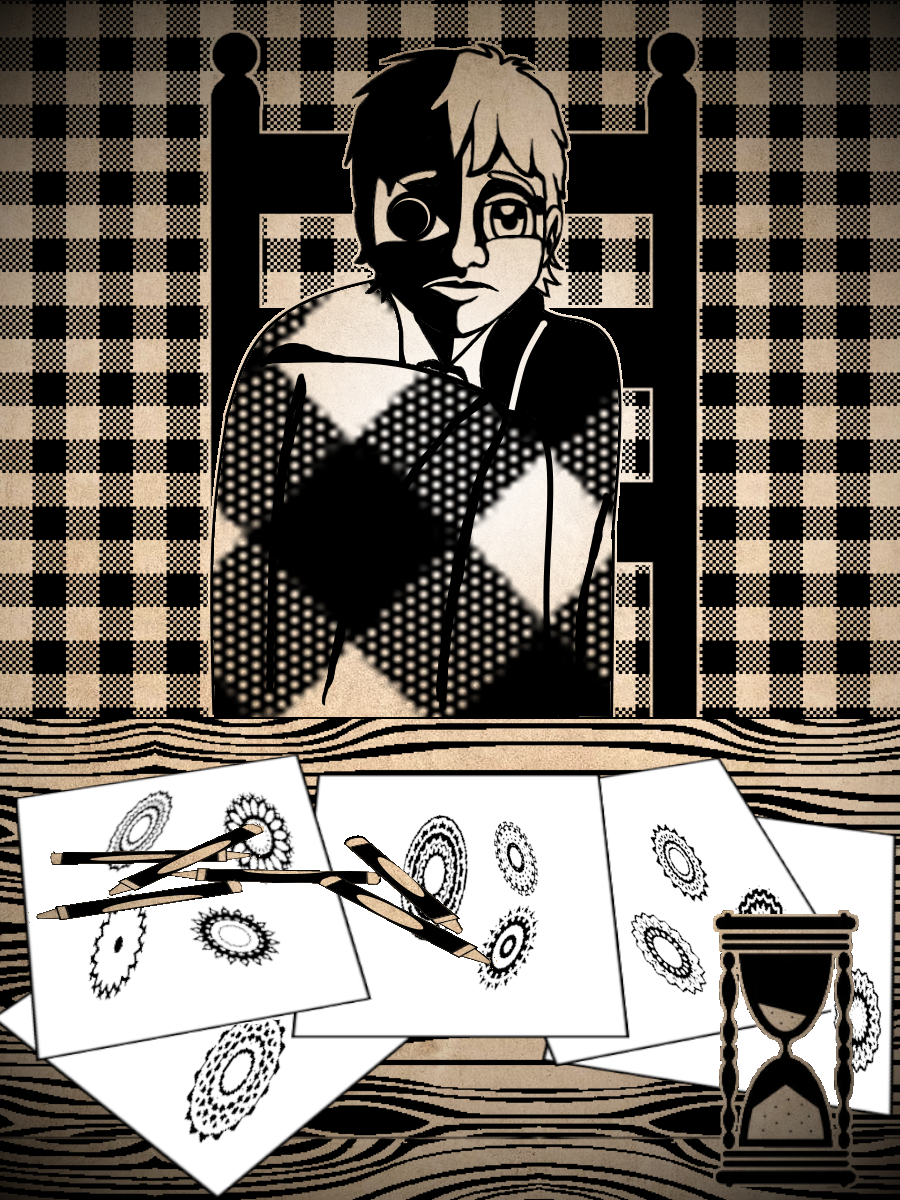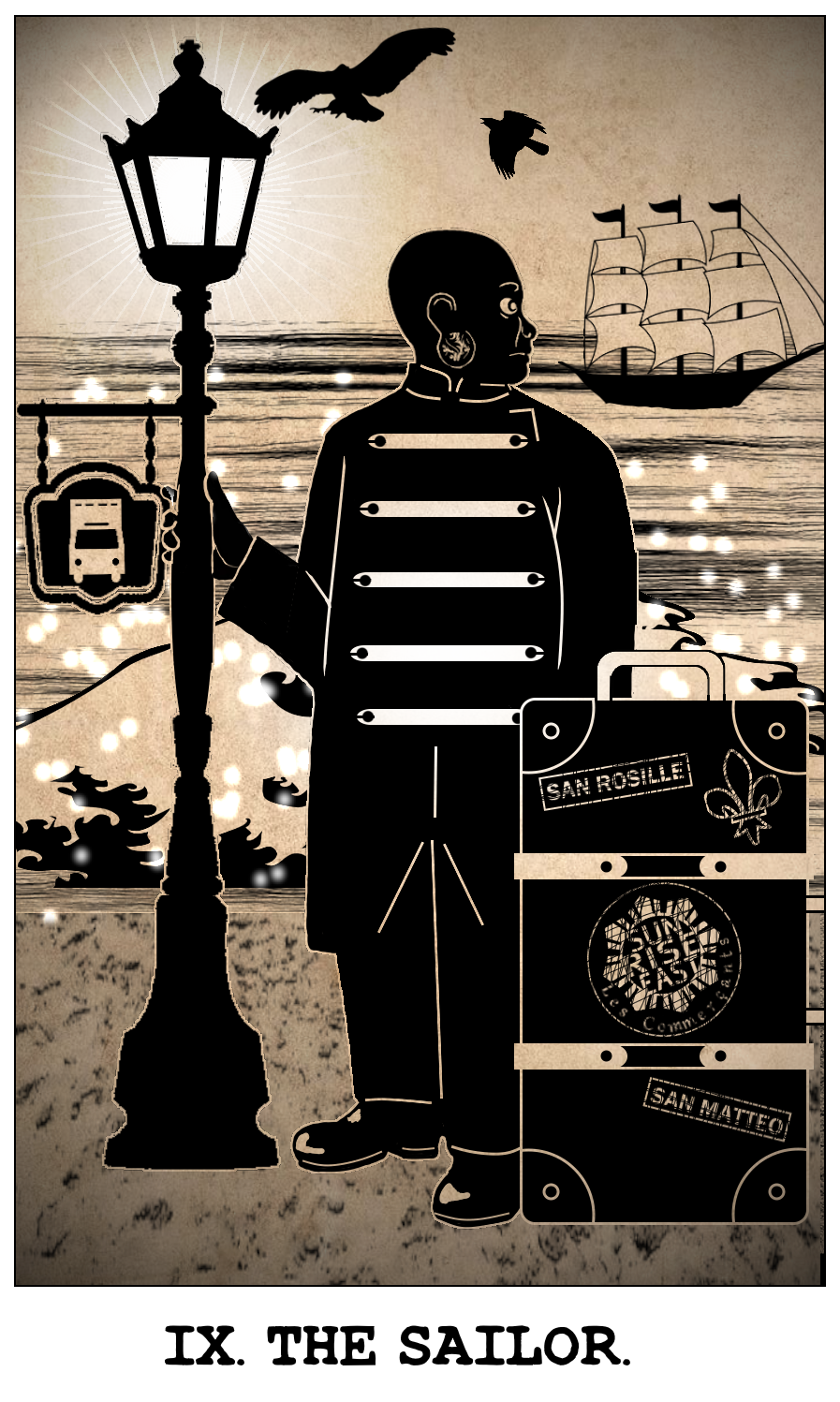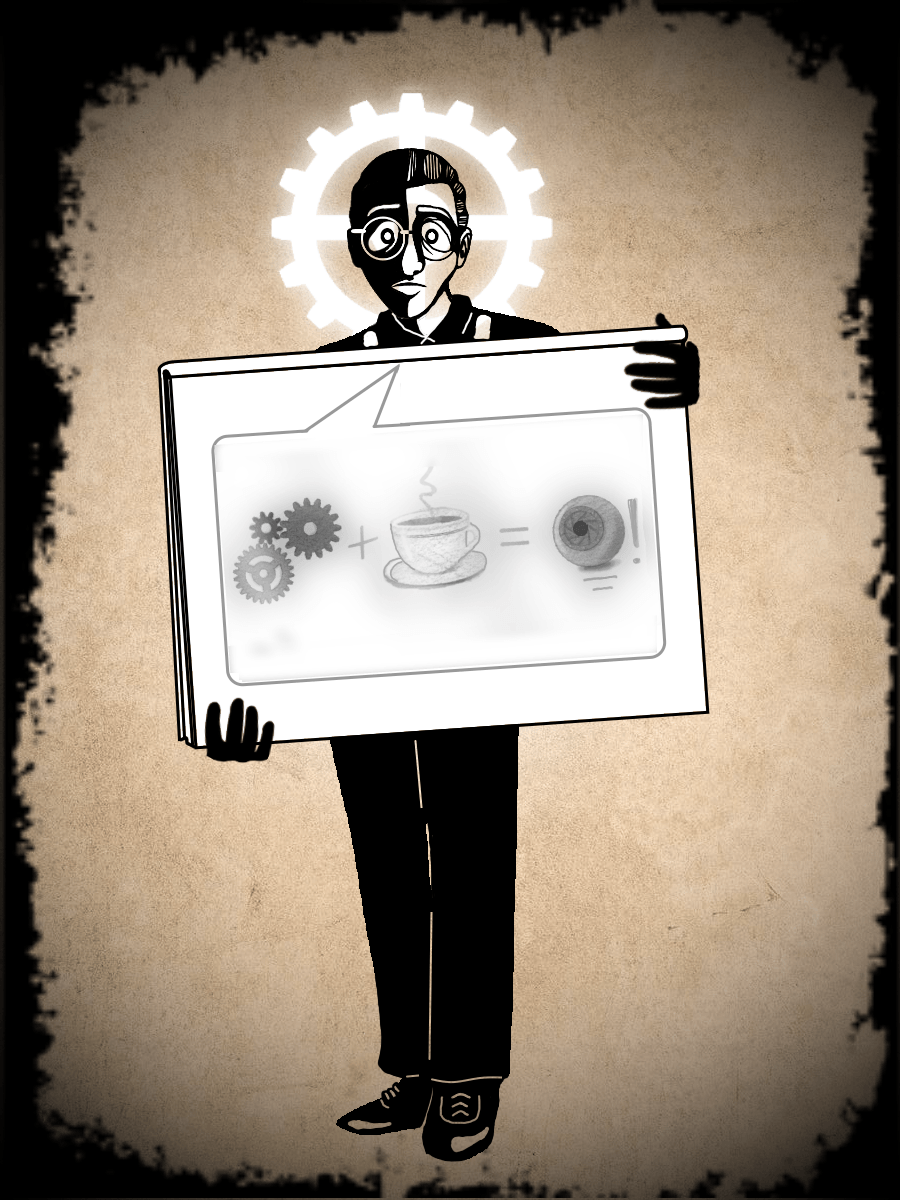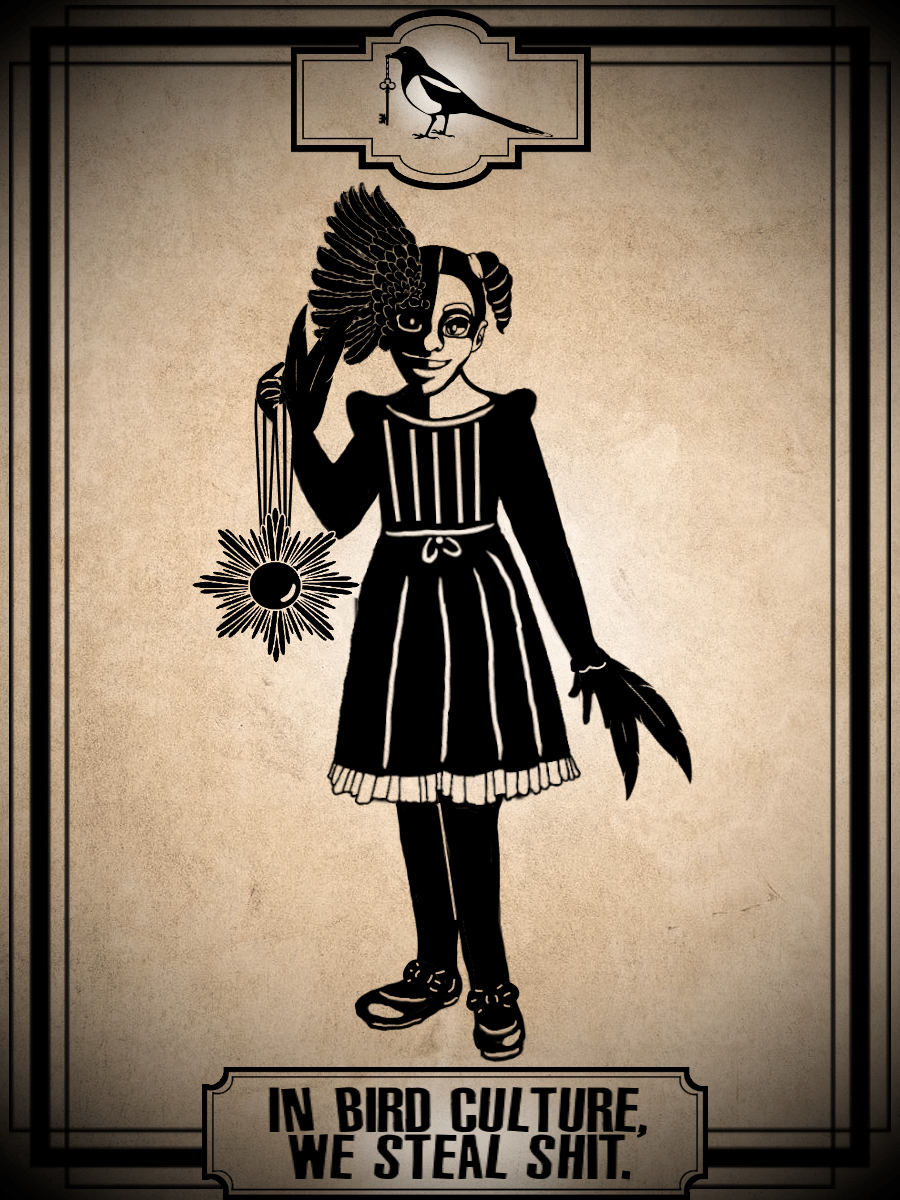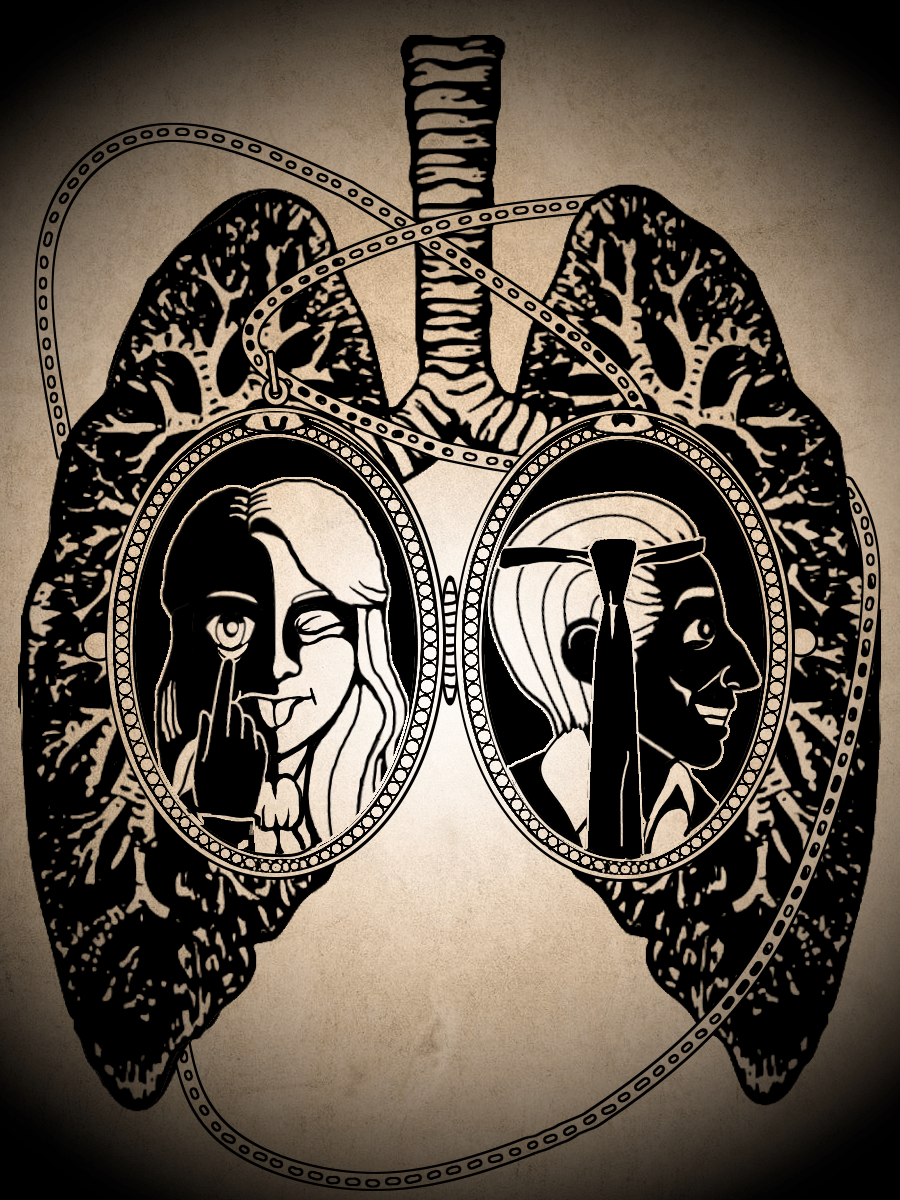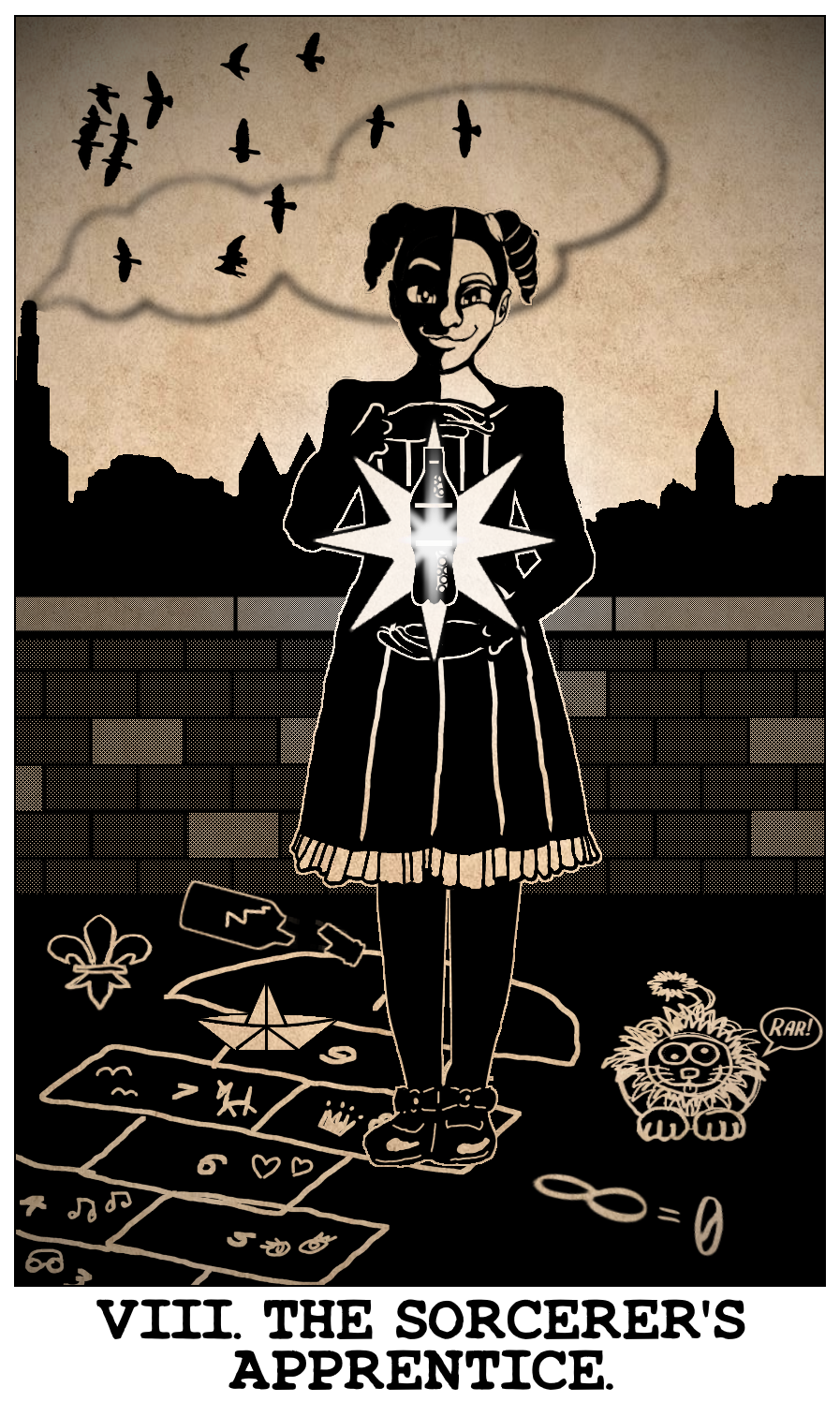Upon consideration, she thought the alligator might eat music.
She couldn’t put it up on the chalkboard for suggested payment, she didn’t want him to know what she was doing. He might tell her not to, and some things stayed up on the board for a long time before anyone brought them, especially odd things (like the paint). She didn’t want him to have to wait. So she couldn’t put it up on the board, but she started asking people.
She asked everyone else in the house and got them in on it too. Even Erik. (Erik was certainly capable of keeping a secret. He had run off and called a god without letting on about it.) No one had any idea where she could get a violoncello.
Well, no, that was not strictly true. Barnaby had too much of an idea where she could get a violoncello.
“When?” he asked her, attempting to narrow it down.
“As soon as possible,” she said.
He sighed and folded his arms and peered down his nose at her.
“Okay, how about within a week?”
He wrote this down and continued to write, or possibly draw charts. “Where does it need to be?”
“Well, I have to be able to get to it on the bus. Or in walking distance.”
He sighed again, looked up and stopped writing.
“How about a ten-mile radius?” she said.
“Eleven is better.” He began to write again.
“Okay. Eleven. Geez.” She shook her head. “And I have to be able to afford the damn thing, Barnaby. Do not send me to a ’cello store. I could look that up in a phone book. Used. Or damaged, but not so much it can’t be fixed, like Julia.”
He lifted the pencil and blinked at his work. “Now you are getting a little too specific, Hyacinth.”
“Sorry.”
He grinned at her and clasped his hands over his desk. “May I have an animal? I think perhaps a goat might do it… No. A swan!” He lifted the paper and looked over it. “Definitely a swan. It’s artistic! A white one, of course.”
“Oh, gods, Barnaby…” She covered her eyes with a hand. He would find her one that way, that was the hell of it. He’d give her an address. Maybe even the cost. But she’d have to bring a live swan into the house and let him kill it.
Nevermind the expense and the cleanup issues and the fact that you couldn’t even eat a swan (could you? Maybe not after Barnaby was done with it). First and foremost, she did not like killing things.
She had taken a vow. It was a long time ago — but she had kept up with it. She could still eat meat and let other people kill things, she just shouldn’t kill them, not even ants, because she was a medic and that meant working with Auntie Enora and Auntie Enora did not like people who killed things. And now, well, she was back in a situation where she might be meeting Auntie Enora again, and she definitely wanted Auntie Enora to like her.
She would not be killing the swan. Barnaby was still perfectly capable of killing things, even a swan (though there might be some screaming and running around). But he couldn’t leave the house and that swan would not get dead unless she had a hand in it.
It was like appliances that took sacrifices. Milo or someone would be happy to kill the requisite mice (or whatever) for her, but it would be in her house and on her account. Auntie Enora might let her get away with that, but she didn’t like it.
That, plus the cleanup and the waste and the screaming and running around, all that made her reluctant to bring Barnaby a swan, even to get a violoncello.
“Look, gimme a little while,” she said. “Let me see what I can do on my own.”
“Oh,” he said.
She thought she would give it a week, and while she was out looking for a ’cello she might also make some inquiries about a swan.
She tried the second hand shops in the neighbourhood first. The nearest was on Sabot Street. There was a lot of dust and books and clothing and shoes. There was some furniture that she took note of (Mordecai could use a chair and some bed frames), a couple of guitars and a ukulele, but nothing of ’cellos.
On Frig’s Day, she got on the bus and hooked downtown. Milo was looking downtown, he had done some cards about wanting a ’cello, but people weren’t always straight with Milo about things. They thought he was simple.
She couldn’t blame them for thinking that, he acted weird and he couldn’t explain himself, but she did blame them for trying to screw him.
She was also a little frustrated with him for letting them do that.
She was coming out of a butcher’s on Seventh Avenue, (“You want a what? Alive?”) and heading for what looked like a thrift store half a block down (she could make out a yellowed wedding dress and a phonograph in the front window) when she came across the intersection with Herald Street. That rang a bell and eventually brought up the elevator with the memory in it.
Ah, yes. The child-kicker lives on Herald Street.
Well, as long as she was here, she might as well see if she could get another pair of eyes searching downtown for a ’cello, even if the brain they were attached to belonged to John Green-Tara.
He had managed to find paint — it just took him three months and he couldn’t figure out a better way to transport it than two cans at a time all day on the bus. And he could speak and make eye-contact with people, so that was an improvement over Milo at least.
She walked into the first establishment on Herald Street that was open to the public and had people in it, a lunch counter. Just a little hole-in-the-wall place with black and white tile and wooden stools, and a metal bar under the counter for you to rest your feet. There were three gentlemen doing so at the moment, and one behind the counter, pouring a soda.
The place smelled like salt and vinegar. There were cold sandwiches and mayonnaise and pickles and potato chips. A poster affixed to the wall proclaimed that they served Pin-Min sodas, and the ant mascot was shown indulging in one. She inquired if anybody knew where she could find John Green-Tara.
“Green-Tara?” said a man in a grey flat cap. “Oh, yeah, the tongs!”
“No, no, no,” said a man in a tweed vest. “Tongs are from North Atria. The Green-Taras are preets.”
And I have learned a new ethnic slur today, thought Hyacinth. People from Priyat are preets. What a magical world.
“All Atrians are tongs,” said the man in the grey flat cap.
“Oh, come off it! They don’t even have slitty eyes!”
“They’ve got this store,” the man behind the counter informed her, aside. “It’s two blocks down. Near the corner of Mercy Lane.”
“Of course it is,” said Hyacinth, nodding.
Naturally, the child-kicker lives near Mercy Lane, thought Hyacinth. And not on it.
Naturally, as well, it was two blocks down. She couldn’t get back on the bus without change, and it seemed silly to get back on the bus for two blocks. She would have to get even more change to go home.
She could never seem to keep coins on her. She was always using them — not always as money. Mordecai was the one who brought coins into the house and he hadn’t been doing that lately.
She should’ve gotten a day pass. She did not have real good shoes. They served the purpose, but the soles were thin and they lacked any kind of support. The pads of her feet were sore, and she thought she was nursing a blister on her left heel. There were plenty of puddles due to the spring rains, and her socks were wet.
The store was not a place where she might pick up some better shoes, or some dry socks, or a fortuitous seller of discount, second hand violoncellos. It was a bodega, with cigarettes, candy and bagged chips behind the counter, and newspapers and magazines in front of it.
No brown-paper-wrapped magazines with the titles written on in marker and naked ladies inside like at the bodega nearest the house on Violena. No flyers with nightclubs and brothels on them either. A tasteful bodega.
There was a narrow second and third storey stacked on top, where presumably living and sleeping went on. There was a large front window with a green and white striped awning above. Behind the window was a card table and some folding chairs, all empty at the moment.
Herald St. News was painted on the glass in white. A logo with a red elephant in a circle was beneath that. At the bottom of the window, more white printing promised Candy — Cigarettes — Magazines.
In the corner of the window, past Magazines, there sat a small green statue of a strange god with four arms, complicated hair, and slitted eyes. It didn’t look anything like jade, maybe painted plaster or polyresin. It needed dusting.
Hyacinth examined her reflection in the glass. A middle-aged woman with frazzled hair, a thin build and a plain dress, carrying a battered black purse that bore more than a passing resemblance to a doctor’s bag.
She took the tie out of her ponytail and tossed her fingers through her hair. Then she thought, What the hell am I doing? Do I care if I impress these people?
No. No, she did not. She did not particularly care if she impressed anyone. If she needed to be impressive, she could start shouting, that was how she usually did things. She was distracted by the need for a ’cello, that was all.
She tied back her hair and she pushed open the door. There was a string of gold bells dangling from the handle. They tinkled.
“Just a moment, please!” called a woman’s voice. In maybe half a moment, the woman in the green dress emerged from behind the beaded curtain that partitioned off the back room. Actually, she was now the woman in the rose pink dress, with a red and purple paisleyed shawl pinned to her shoulder — by a tasteless gold sea turtle that had glittering diamond chips in it.
Hyacinth stared at it. Oh, my gods, she really did have the damn thing remade. She glanced at the woman, who was a bit dark, but not really more tanned than some dockworkers she’d seen. Is it possible that sort of thing is not tacky in Priyat? Perhaps it is the height of fashion? Are they that backward over there?
Am I backward?
The woman’s dark eyes widened, and then narrowed. Her mouth pulled into a snarl. “You!”
Oh, right, thought Hyacinth.
“Butcher! Murderess! Quack!”
Hyacinth sighed and pressed a hand over her eyes. Yes. All right. I hurt your delicate baby angel. You know, over at the hospital, they were trying to remove mergers from your delicate baby angel with tweezers. They took chunks out of him. I patched him!
She did not say any of this. She still held out hope that once the woman was done screaming at her, she might be willing to provide access to said delicate baby angel. It was not much hope, but Hyacinth had been willing to let John Green-Tara near Erik again, and John Green-Tara had actually hurt Erik.
Okay, she guessed she had actually hurt John Green-Tara, in the sense of causing him physical pain. That was what the woman was screaming about. But that was just a condition of fixing people with metal. It wasn’t sadism.
Even if she’d felt he deserved it at the time.
“How dare you show your face in my store? In my home! Get out of here! I’ll call the police! I’ll call the fire brigade! My cousin Dipa is a lawyer!”
Hyacinth could not suppress a laugh. Do you think you’re going to sue me? Or are you trying to set me up with him?
The laugh was most unwise. The woman in the rose pink dress gave a shriek and attempted to launch herself over the counter. The dress prevented it, but she did successfully knock over a pasteboard display with cigarette lighters in it.
Fires the first time! a grinning man informed her in slick italic printing.
“Mom!” cried John Green-Tara. He snatched her by the shoulders and planted her feet back on the floor, preventing her from making another go at Hyacinth, and from landing on her rear end.
Hyacinth felt a frown drag down one corner of her mouth. She tilted her head to that side. Sea Turtle, were you back there the whole time? she thought acidly. Who did you think she was yelling at out here? The other quack?
“Johnny, do you know who that horrible woman is?” said the woman in the rose pink dress.
“Uh, yeah,” said John. He twitched a weak smile and touched a hand to the back of his neck. “I kinda said she could come over.”
And we were both idiots for thinking your mother would be totally cool with that, thought Hyacinth.
“My name is Hyacinth, actually,” she said. After a moment’s hesitation, she offered her hand.
The woman took a step backwards, frowning thunderously.
John reached across the counter and shook her hand.
“Yes, I believe we’ve met,” said Hyacinth.
“Mom, uh… Why don’t you go check on Tommy and Jenny?”
“Check on them?” the woman said. “Do you think I’m going to leave you alone with that creature? Your brother and sister are fine! They are listening to the radio!”
“Jenny was into your dresser drawers. I think she’s going to put clothes on the dog again.”
The woman in the rose pink dress uttered a low growl and stomped past John and the beaded curtain. “Jennifer Parvati Green-Tara, you stay out of my fine washables!” There was the sound and shudder of fast feet on rickety stairs.
“Is she really?” said Hyacinth.
“Oh, she usually is,” John replied, peering past the curtain. “Do you need some more paint?” he asked her.
“No, no. We’re good on the paint,” Hyacinth said. “Actually, I was looking for a violoncello.”
“I don’t think…” John said. He pulled the curtain aside. “I think we have a couple of those little painted guitars that say ‘San Rosille’ on them. From Cloquette Day…” He peeped out again. “It’s an instrument, right?”
“No, not from here,” said Hyacinth. “I mean, yeah, if you had one, that’d be great. But I was wondering if you’d seen one around. For sale. Anywhere. Second hand. Broken or something.”
She shook her head. That was an assortment of random words. It was hard for her to follow that and she knew what she was talking about. She rephrased, “I’m looking for a cheap violoncello. Have you seen one?”
“What do they look like?”
Hyacinth blinked. That was reasonable. “Well, you may have noticed one travelling at a high rate of speed towards the general vicinity of your head on a certain day this past summer.”
He considered that.
“Oh, one of those.”
“Yeah. It’s kind of a replacement…” She belatedly wondered if asking John Green-Tara to find her a violoncello might be tackier than the sea turtle pin. He had gold repairwork patching where pieces of violoncello had been removed from his face.
Well, he was asking for it, she thought, frowning. She wasn’t going to turn around and apologize now.
“No,” he said. “Sorry. I haven’t seen anything like that around.”
“Yeah, I figured it was a long shot. I don’t suppose…” As long as she had him, she might as well ask about a swan.
“I know where there’s a violin,” he said.
“A violin?” said Hyacinth. She wobbled and put both hands on the counter.
“Sorry. Dumb.” He knocked a fist against the side of his head. “I know it’s not the same…”
“No, no, no! He can play a violin! I know he can!”
She suddenly realized no one else in the house knew that. Possibly not even Erik. And she had neglected to inform them. There had been an entirely different houseful of people when Mordecai had been on the cot in the dining room, going on about the violin. Gregory, and Bill, and Natasha.
Gods, she wondered where they were now. Married? Buried?
Eileen. Eileen was the violin’s name. For a little while, she’d thought he was talking about a person. A wife. He did have a ring. (Though, unfortunately, not a gold one.)
She slapped a palm across her forehead, as if trying to do a touch-know on her own stupidity. “Gods, I’m an idiot. We could’ve been looking for a violin all this time!” Those were smaller, they had to be cheaper. And they were altogether more common.
“Are you teasing me?” John said hesitantly.
“Where’s the violin?” she said.
“Oh. It’s in a bookshop,” he said.
“A bookshop?” She leaned in and lifted a brow.
“Yeah?”
“You read books?”
He blinked at her. “Shouldn’t I read them?”
She eyed him up and down. “I guess it’s better than making end tables or salads out of them, yeah.” She squared her shoulders and lifted her purse like a shield. “Take me there!”
He leaned past the curtain and called up the stairs, “Mom, I’m going out for a second, okay?”
“You’re not going anywhere with that awful woman!” a voice shrieked down.
“No, uh, she’s gone! I’m gonna get lunch!”
“We have lunch here!”
“Different lunch!”
“Don’t you go anywhere with that Edward! I hate that boy Edward!”
“Yeah,” John muttered. “He’s, uh, not real fond of me either.” He raised his voice again, “I won’t, Mom, okay?”
“Put on a sweater!”
He took one with him. He didn’t put it on. It was actually pretty nice out, except for the puddles.
The bookshop was a block back in the direction Hyacinth had come from. Naturally. She hadn’t even registered a bookshop. She hadn’t been looking for bookshops. What was a violin doing in a bookshop, anyway?
It was, she discovered upon arrival, sitting in the front window and helping to advertise the fact that the bookshop had “Sheet Music Available!” It sat upright in an open case with a dusty black felt substance lining it. The bow, some fanned music, and a little sign rested next to it.
“Is it a real one?” Hyacinth said, peering at it.
“Why wouldn’t it be?”
“Well, it’s a display…” But it looked fairly solid, she had to give it that. It wasn’t like a photo on pasteboard or anything.
“Do you think it’s not for sale?” John said.
Hyacinth clutched her purse. “Everything is for sale,” she said.
Negotiation for price did not immediately commence. Negotiation with reality needed to be dispensed with first. The old party behind the counter in the bookshop did not appear to be entirely cognizant that he had a violin in the window, and he was unwilling to look for it.
He also seemed to have a bit of a hearing problem, or maybe it was just a comprehending problem. He had dust on his shoulders, gold spectacles with a crack in one lens, and a large sleeping (possibly dead?) cat on his counter. The cat and the counter and the spectacles were dusty too.
“You want what?”
“I want the violin in the window,” Hyacinth said.
“You want violin music?”
“No! I want the actual violin! In the window!”
“We don’t have violins! This is a bookshop!”
“You have one violin! I am looking at it right now! It is in the front window!”
“Mr. Denholm, it’s over here!” John called over. He helpfully pointed.
Mr. Denholm peered over his cracked spectacles at John. “No more than three teenagers at a time!” he snapped.
John glanced to the left and right of himself, bewildered.
“Leave your bags at the counter!”
John examined his nonexistent teenaged friends for bags. I have a sweater, he thought, lifting it. Should I… put the sweater… on the counter?
Mr. Denholm had returned to his customer. “You want the sheet music in the front window?”
Hyacinth groaned and pointed, “I want the actual violin in the front window!”
“This is a bookshop! It doesn’t say anything about violins on the front window!”
“No!” she said. “It doesn’t say anything about violins on the front window! There just is one! Look, look at the… Look, if you turn your head fifteen degrees to the left I will show you the violin in the front window!”
She would’ve just grabbed it and walked out, he obviously wouldn’t miss it, but it was in a locked glass case and he might’ve noticed her breaking the lock over there.
And then maybe called the police and accused her of trying to steal his sheet music.
“There’s a piano store down on Fifth Avenue,” the man said.
Hyacinth opened her mouth and closed it. She leaned back and folded her arms across her chest. “A piano store. Really. They have a lot of violins over at the piano store?”
“They don’t have any violin music at the piano store. It’s a piano store.”
Hyacinth pounded a fist on the counter. A small grey spider ran out of the cash register and over the dusty cat. This went unremarked.
“Look, damn it, are you physically incapable of turning your head fifteen degrees to the left? Do you require surgery? I’m a medic!”
“Medical books are in Aisle C, next to the typewriter.”
John Green-Tara took a few confused paces down Aisle C and had a look at the typewriter. Yeah, that was over there, all right. What?
Hyacinth finally demanded to purchase the sheet music in the front window, which the proprietor was willing to acknowledge existed.
“Which one? The Mendelssohn? I’ve got it in the back…”
“No! One of the other ones! Please open the case!”
“Oh! Look! A violin!” she noted loudly, a moment later.
Mr. Denholm shrugged and slotted a key into the case. The case was also dusty.
“You know, I quite fancy a violin,” she said. “They didn’t have any at the piano store. Might you be willing to part with that one?”
When he lifted it out of the case, there was a sticker on it! He had intended to sell the damn thing!
“S’thirty sinqs.”
Hyacinth pawed into her purse and drew out a billfold. She had nineteen. A ten, a five and some singles. Julia, the violoncello with whom John Green-Tara was acquainted, had cost Mordecai fifteen — which Hyacinth had to loan him on spec — but she had a great big crack running down her back, and she didn’t come with a case or a bow.
“Lemme have a look at it,” Hyacinth said.
She didn’t know anything about violins. It seemed to be a real one, not a cardboard mock-up or whatever. It sounded like wood. There were no obvious imperfections or bits falling off. There was the same number of twisty-knobby-things on each side. The strings were intact.
The bow was shedding a bit. She was aware that they tended to do that. It wasn’t a dealbreaker. The leather or leather-like stuff on the outside of the violin case was cracked and peeling.
“The bow and the case are shit,” she said. “I’ll give you fifteen.”
“Can’t let it go for anything less than twenty-five.”
“Let it go?” cried Hyacinth. “You didn’t know you had it five seconds ago!”
“It sells sheet music.”
“That… What… How could you possibly have any idea whether it sells sheet music or not? You didn’t even know…” She clapped a hand over her mouth. She growled and shook her head. This was all pointless.
She upended her billfold on top of the glass case in the window. “I have nineteen. That’s all I have. You don’t need a violin to sell sheet music. You can buy a great big sandwich board that says ‘Hey! I have sheet music!’ for a sinq. You can have them paint a violin on the sandwich board, bigger than life! That’s eighteen sinqs profit, okay?”
Mr. Denholm pushed up his spectacles and pawed through the notes on the case. “All right, twenty-three.”
“Did you not just see me…?” said Hyacinth. “All right. Wait. Here.”
She upended her purse as well. “Nineteen and a penny,” she picked it up and showed it. “And a mint. And a first aid kit, and a notepad and a pencil! What about that?”
Mr. Denholm put a finger on the penny and doubtfully added it to the pile of notes. “Twenty-two,” he said.
“John!” said Hyacinth, desperately. “If you spot me three sinqs, I’ll pay you back with interest, okay?”
John obligingly turned out his pockets. He had two singles and seventeen scints.
“Twenty-one eighteen!” Hyacinth said. “Come on!”
Mr. Denholm frowned at the money.
“Twenty-one eighteen and I’ll send this really amazing guy down here tomorrow to fix your glasses!”
“I don’t sell glasses,” Mr. Denholm said. “This is a…”
“It’s a bookshop, yeah!” said Hyacinth. “Oh, gods!” She wasn’t going to leave that violin here. She wasn’t going to go through all this again tomorrow. Not for eighty-two scints! The bus ride was half that!
“That’s a nice sweater,” Mr. Denholm said. “Is that wool?”
John regarded his sweater. “I think it’s yarn.”
John Green-Tara and Hyacinth emerged from the bookshop triumphantly, plus one violin in a cracking leather-ish case, and minus twenty-one sinqs, eighteen scints, a mint (Hyacinth had forgotten to collect her mint) and a sweater.
Hyacinth froze in mid-step three paces from the door. “Damn it, I don’t have any money for the bus!” She’d have to walk home! In these shoes!
“I can give you some money from the store,” John said. “I don’t think Mom’ll miss fifteen scints. I could just tell her I spent it, if she does.”
“Oh, the store,” said Hyacinth, gazing back up the street. That was another block.
But that was better than seven miles home.
“Thank you,” she said.
“Maybe you’d better not come in, though,” John said.
◈◈◈
“So, do you have a dad or anything?” Hyacinth said.
She sighed and put a hand over her mouth. She just wanted to make conversation, but she had played the last of her “I’m going to think this but not say it” cards back with the insane ass of a man who didn’t understand he had a violin for sale. She was tired. Wrestling with her goddamn mouth took energy.
I am going to have to be really careful and not mention I think it’s interesting people from Priyat are called “preets.”
“I mean,” she went on, “you seem like you have a pretty normal home life, for someone who kicks six-year-olds… That in no way mitigates what I’ve just said. I am sorry. I am an idiot.”
John paused walking but did not look over. He shrugged and continued. “I’ve had one, I guess. I mean, a dad. I don’t at the moment. We kinda had this war…”
“Yes,” she replied. “I am vaguely aware of that war we kinda had. I may have done one or two things during it.”
The war had eaten up a lot of dads. Men and women — and boys and girls — but more dads than moms. There was something sacred about moms.
In the last year, they had been allowing fifteen-year-old kids and untrained volunteers in, so desperate for warm bodies that could wear uniforms and pull triggers, but even then, the army preferred to turn away women with children.
Obviously, you could get around it. Hyacinth was pretty sure the General had Maggie during the war, somehow juggling nursing and diapers and walking the floor with guns and tactics and turning into a giant eagle. She guessed probably Sanaam had done a lot of the childcare, and he seemed to have been competent at it, but popular imagination didn’t peg fathers that way.
Men were expendable. Women were the ones with the wombs and the breasts.
“I guess Mom could get remarried if she wanted,” John said, “but she doesn’t seem bothered about it.”
“Are you bothered about it?” she asked.
“Mom getting remarried?”
“I was thinking more the dead father thing, but I guess whichever.”
“I dunno.” He shrugged again. “I’m used to it. I was ten. Tommy doesn’t really remember him and Jenny didn’t know him. We’ve got some pictures. We’ve got the store, so we do all right.”
“You seem like you’d have a lot easier time of things if there was someone around to staple your mother to the floor on occasion, if you don’t mind my saying.”
He considered with a hand to his mouth. “I guess that’s what I do.”
“You’re not very good at it.”
“No.”
“You go into that bookshop a lot?” She still couldn’t fathom this kid reading books, not even if she pictured him in glasses like Milo. It was like putting glasses on a baby deer, or clothes on a dog. Aw, he thinks he’s people.
He frowned. “Not sure. I go in there, but you’d think Mr. Denholm would remember me if it was a lot.”
“I would not think that at all,” Hyacinth replied. “What in the hell do you read?”
“Poetry.”
“Oh, yeah. There you go. I can see that.”
Barely. A baby deer in glasses reading romantic sonnets in a graveyard on a cloudy day. She wasn’t sure what she would’ve done if he came out with something like “Theoretical Physics” or “Natural History.” Panicked and punched him, maybe. Shut up! No!
“There’s this one about a guy on a boat and a dog,” he said. “It takes him ten years to get home.”
A guy on a boat and a dog?
Ten years…?
Hyacinth stopped in the middle of the street, pointed a finger at John Green-Tara and accused, “The goddamn Odyssey?”
“I think?” he said weakly.
“Shut up! No!”
“Maybe that’s not it,” he said. “Maybe it’s the other one… whatsit… The Alien.”
“The Aeneid?”
“Yeah.”
Hyacinth dropped the violin case and folded her arms across her chest. “I don’t get you,” she said.
“What’s there to get?”
“Internal consistency!” she cried.
“…Sorry?” he hazarded.
“You have no idea what I’m talking about, do you?”
“Not… No. Sorry.”
A knee-high dog of indeterminate parentage and curly brown fur (or possibly the world’s ugliest monkey) waddled past wearing a pair of ruffled pink bloomers. It paused and looked up at John with a soulful and suitably humiliated expression.
“Argos, come back!” a high voice shrieked. A small brown girl with gorgeous blue-black hair that made Hyacinth want to strangle her came barrelling after the dog, right through a puddle.
Argos, thought Hyacinth, staring. Right. The dog.
“Hi, Johnny!” the girl said, smiling.
John was bent over and mercifully undressing the dog. The dog appeared patient but miserable. “Jenny, are these Mom’s?” He held up the bloomers, turning them from back to front against the sunlight. Argos wagged his fluffy tail.
“No, they’re mine,” the girl replied. “Mom’s don’t fit. You have to put a garter. Who’s the lady?”
“Um, it’s Hyacinth.” He folded the bloomers and then he didn’t know what to do with them. He didn’t think they should go in a pocket. He didn’t want to keep holding them either. They couldn’t go back on the dog. “She fixed me with Mom’s pin.”
He put the bloomers down the front of his shirt.
Okay! he told himself. That was possibly the worst option, and I went with it!
Jenny offered Hyacinth her hand. “I’m Jennifer. You made my big brother cry,” she said.
“I do that to a lot of people,” Hyacinth said.
“I like that he’s sparkly,” Jenny opined, “but he won’t let me put glitter on him so he matches.”
“Maybe you should try dressing him up.”
“I do, but he’ll only wear saris. And I can’t braid his hair. He’s totally boring.”
“Jenny, could you take Argos home and bring me fifteen scints from the cash register?” John said. “Hyacinth needs some money for the bus, and Mom doesn’t like her.”
“If you say I can put glitter on you later,” Jenny said.
“No. Not glitter.” Glitter didn’t come off. It was almost as bad as the mergers. “Stickers, if you want.”
“The fuzzy stickers with the bunnies?”
He sighed. “Yes.”
“Okay.” She beamed at Hyacinth. “I’m a tough negotiator! My brother’s a pushover.”
“Apparently,” said Hyacinth.
“Jenny, grab some of those glove warmers out of the box in the back, too, okay? The box has mittens on it.”
“Then aren’t they mitten warmers?” Jenny said.
“…I’m not sure now,” John said.
“Come on, Argos!”
Argos was willing to follow the little girl who tormented him with ruffled bloomers home, faithful like his namesake.
“How old is that girl?” Hyacinth asked.
John looked pained. “Six. She’s six.”
Hyacinth considered that for a while. “But not green,” she said finally.
He closed his eyes and shook his head. “No. Not green.”
Hyacinth was willing to leave it at that, or at least she had no idea where to take it from there, but John spoke up again, “I don’t know why. I didn’t know then and I still don’t. I didn’t think it was funny.”
He sighed.
“Not good funny.”
“I don’t know if it matters,” Hyacinth said. “I mean, it’s not like you’re going to come up with a good reason. I’m not going to go, ‘Oh, yeah. I understand. Good job.’ You did an awful thing. But you’re not going to do it again, are you?”
He shook his head, looking down.
“And you’re doing stuff about it. I respect that.” She picked up the violin case. “This thing is really going to help. You have no idea. It’s a lifesaver. Are you going to get in trouble about that sweater?”
“I dunno. Maybe. I can just say I forgot it someplace. I do that.” He shrugged. “Does Erik know what I did? Do I upset him?”
“I’m pretty sure no,” said Hyacinth. “To both. He knows a lot of stuff these days, but all he’s said about you is you brought us paint and you tore your coat on our wall and you’re funny.”
“Do you think I should tell him?”
“I think eventually, but not yet. The kid’s got enough to deal with.” She eyed him. “And I think maybe you do too.”
“Do you think I ought to stay away?”
“I think you ought to stay away from Mordecai. Erik’s uncle. The red guy.”
John nodded.
Hyacinth lifted the case and considered it. “I think maybe I’m not going to tell him Erik’s funny paint man helped find him a violin. He’d ask questions. Is that okay?”
“Yeah.”
“I’m not going to tell you to stay away, or come back, or anything. I think you and I are square, it’s everyone else you’ve got to worry about. If you do come back, be careful, right?”
He nodded.
“Where’s the nearest bus stop, anyway?”
“Oh, it’s out in front of the store.”
“The nearest bus stop is out in front of the store,” said Hyacinth.
“Yes.”
“Your store.”
“Yes.”
“You have sent your little sister to the store to bring us fifteen scints back here, and we are going to the bus stop so that I can get on the bus with the fifteen scints, and that bus stop is out in front of the store.”
“…Yes.”
“You have agreed to let her put fuzzy bunny stickers on you so that she would do that for us, also.”
“Yes.”
“Are you aware of how stupid that is?”
“Very much now, thank you.”
“Do you think we should walk towards the bus stop and the store, or will your little sister walk past us to where we used to be?”
“My little sister is a lot smarter than me.”
“Thank gods.” She offered John Green-Tara her arm.
Jenny met them halfway with fifteen scints and a handful of glove-or-possibly-mitten-warmers in flat white paper packets. Hyacinth thought they looked disturbingly like contraceptive charms.
“I think these might help dry out your socks,” John said, offering them. He nodded to her muddy shoes and the spattered hem of her dress. “We have a lot of them left over from winter because they don’t work very well,” he added.
“They might help dry out my socks and they don’t work very well,” said Hyacinth.
He sighed and put a hand over his eyes. “Yes.”
Hyacinth accepted them and put them in her purse, “Thanks very much.”
She tried a couple in her socks after she got on the bus and she could slip off her shoes for a second and sit down.
They didn’t work very well.

